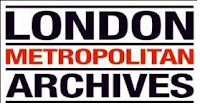London
Metropolitan Archives:
LGBT
History and Archives Conference 2003-2012
Ten years ago London Metropolitan Archives
established its annual LGBT History and Archives Conference to open up
discussion, explore historical evidence and to actively encourage the
collecting, preservation and recording of individual and community histories. Collecting,
preserving and sharing LGBT histories is essential to provide the balance in
the historical record. Without these voices the only story is the official one,
those in authority talking about people, not the people speaking for
themselves.
To read the complete paper, please click on "read more"!





























